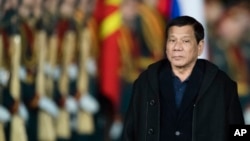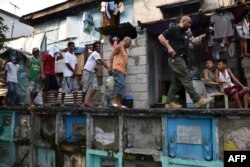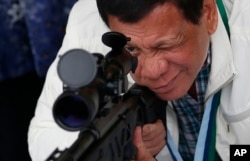U.S. President Donald Trump and Philippine counterpart Rodrigo Duterte have some things in common. Both rose to power by vowing to shake up their political establishments. They refuse to back down, no matter how hot the controversy. They attack critics with blistering insults, and they have shown a strong dislike for Trump's predecessor, Barack Obama.
Now the two mavericks will meet face to face Monday amid questions about whether they will get along or something will set off a conflict between two alpha males that will further fray strained U.S.-Philippine relations.
Trump arrives Sunday for a summit to mark the 50th anniversary of the Association of Southeast Asian Nations.
Duterte recently issued a terse warning to Trump to avoid criticism of the draconian measures he has imposed to tackle the Philippines' many problems. But it seems unlikely the U.S. leader will jab at the most sensitive subject, Duterte's war on drugs, considering that Trump already has praised the effort.
'Lay off'
"You want to ask a question, I'll give you an answer: Lay off," Duterte told reporters in Manila. "That is not your business. That is my business. I take care of my country and I will nurture my country to health."
Riding an anti-crime, anti-corruption platform that resonated with voters weary of holdups, kidnappings for ransom and terror attacks, Duterte has been in office about half a year longer than Trump. He has maintained a strong approval rating, despite the bloody war on drugs that by most counts has left nearly 4,000 people dead.
There appears to be an understanding by much of the public that the country had to suffer some pain to roll back the steady decline that left investors and tourists hesitant to commit to the sprawling archipelago, despite its beaches, diving and a populace of 100 million where English is widely spoken.
Duterte has acted decisively, setting curfews that left the country's lively nightlife businesses groaning, cutting soaring crime rates, and telling police he would back them if they killed drug dealers and addicts.
He has brusquely, and vulgarly, lashed out at those who claim his methods amount to widespread human rights violations, including the United Nations and the United States, specifically Obama.
The Philippines' relationship with the United States is best described as complicated. The United States was the colonial power for decades after Spain departed, and while Washington has provided significant aid, including humanitarian assistance for the disaster-prone country, many bristle at the perception that Washington still treats it like a colony.
Duterte has plugged into that sentiment by threatening to break ties completely and cozy up to China. He has courted Chinese aid and investment, and he has managed to play Beijing's desires to spread its clout against U.S. concerns of losing influence in the region.
Chinese spending
The result has been billions of dollars in commitments from China and a rise in business confidence in the country without the severing of U.S. security ties that Duterte had threatened. Only two of dozens of annual joint exercises and engagements with U.S. forces have been eliminated. Others have been shifted to other parts of the country to avoid possible conflict with China over his buildup in the disputed South China Sea.
And while polls show that perceptions of U.S. importance have slipped and those of China have risen, the changes have been considerably less than Washington had feared.
One of the key areas of cooperation with Washington, the war on terrorism, has been left untouched. American military counterterror trainers flowed in after the then-al-Qaida-linked Abu Sayyaf group carried out mass kidnappings and terror attacks in the early 2000s.
In what the U.S. called the second front in the war on terror after its invasion of Afghanistan following the 9/11 attacks on New York and Washington in 2001, that aid has continued and the format has been used by Washington as a model in Indonesia and elsewhere. The training and donations of American arms, ships and aircraft have bolstered the underfunded Philippine military and raised its professionalism.
Duterte most likely will have a wish list for Trump as he continues to play his balancing act between Washington and Beijing. With the United States eager to maintain a presence in the region amid Chinese expansionism and North Korea's threats, it's likely the deal-making Trump will have an open mind and try to cultivate a lasting friendship.






